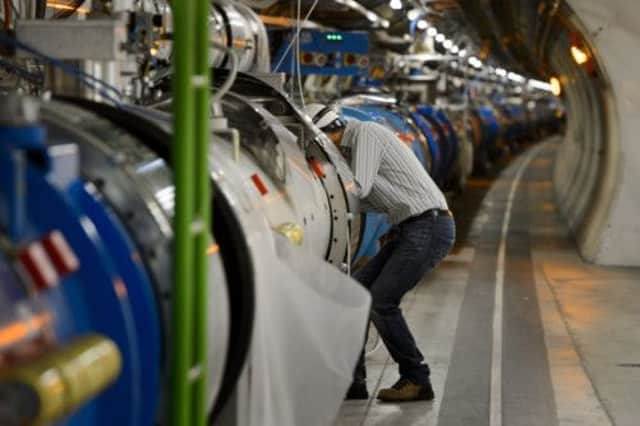Scottish independence: Scientists setback fears


The Institute of Physics (IOP) in Scotland, which represents 3,000 members, said the Scottish Government would be forced to renegotiate access to facilities such as the Large Hadron Collider at CERN in Switzerland and space missions of the European Space Agency (ESA).
In its submission to an inquiry being held by the House of Commons’ business, innovation and skills committee, the IOP said membership of Research Councils UK allowed Scottish scientists “excellent access” to CERN (the European Organization for Nuclear Research), the telescopes of the European Southern Observatory and ESA missions.
Advertisement
Hide AdAdvertisement
Hide AdIt warned that the government of an independent Scotland would not only be forced to renegotiate access, but also provide funds to secure it.
Scotland’s universities are already facing the threat of losing millions of pounds of research funding following independence due to doubts over access to the funds of Research Councils UK.
The IOP said an independent Scotland would also need to consider how funding from influential UK charities such as the Wellcome Trust and the Leverhulme Trust would be maintained.
And it adds there are “major uncertainties” about how international companies which have bases in Scotland will view a move to independence.
In its submission to the parliamentary inquiry, it wrote: “Currently, research groups in Scotland have excellent access to international science facilities such as the accelerators at CERN, the telescopes of the European Southern Observatory and the space missions of the European Space Agency, for example, through subscription funding from the UK research councils.
“The government of an independent Scotland would have to renegotiate access to these facilities and various bodies, such as CERN, ESO and ESA, and provide sufficient funds to secure that access. Currently Research Councils UK facilitates research with international partners.”
The IOP’s concerns echo those of other academics who fear Scotland’s reputation for science will be damaged.
Last year, constitutional expert Alan Trench, a senior research fellow at University College London, said institutions north of the Border would no longer be able to access the “hugely disproportionate” levels of funding they receive from Research Councils UK following independence.
Advertisement
Hide AdAdvertisement
Hide AdSome of the country’s larger universities, including Edinburgh and Glasgow, currently receive up to 40 per cent of their funding from the body, which is made up of seven separate research councils, including the Arts and Humanities Research Council and the Medical Research Council.
In 2012, Scottish institutions received more than £229 million from Research Councils UK – 15.2 per cent of the total budget – despite having just 8.4 per cent of the UK population. A further £121m was received from charities.
Scottish Government officials are understood to be currently working on a range of policy papers that will set out exactly how both research funding and the issue of tuition fees would be approached under independence.
Last year, the government commissioned Professor Sir Ian Diamond, principal of Aberdeen University and a former chair of Research Councils UK’s executive group, to look into the issue, but his report has not yet been issued.
A spokeswoman for umbrella body Universities Scotland said: “Whatever constitutional future Scotland chooses, it is very important to universities that Scotland remains part of the collaborative research ecosystem which includes Scotland, the UK, Europe and international partners.
“Scotland’s universities are world-leading when it comes to research, with five institutions in the world’s top 125 for scientific performance. This brings tremendous benefits to Scotland including significant inward investment from industry and charities.
“Universities’ priority is that they can access funding and can form the partnerships that allow them to compete on the world stage. As and when different options for research are explored at the political level, we are confident that all policies will put this priority front and centre.”
A spokeswoman for the Scottish Government said: “We recognise the importance of international research excellence in science and access to international science facilities.
Advertisement
Hide AdAdvertisement
Hide Ad“We regularly work with the sector, the Scottish Funding Council, UK Research Councils and the UK government on a number of issues around research and will continue to do so to ensure Scotland’s research excellence continues to be supported in an independent Scotland.”